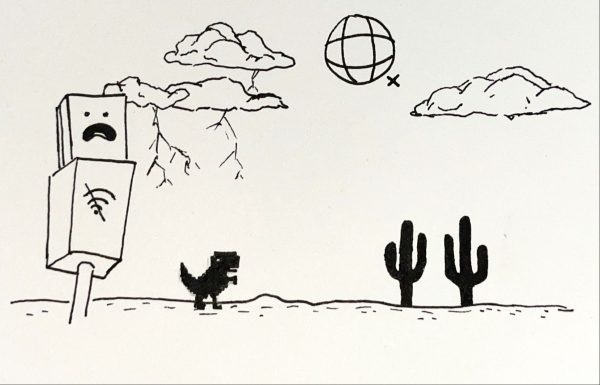Action can delay apocalypse
January 26, 2005
If you’re reading this, it means that the world hasn’t ended yet. The missiles are still in their silos. The machines have not taken over. The UFOs have not landed, and Jesus has not yet come back.
But if you believe the end is near, you’re not alone. To take just one example of the above, a 2002 poll reported 59 percent of the country believes the events described in the Book of Revelation will come true. Judging from the past few years of American foreign policy, one has to wonder if our government isn’t trying to give God a helping hand with Armageddon.
Fundamentalist Christians don’t have a monopoly on the Rapture, though; many futurists anticipate the coming of an event called the Singularity, a sort of techno-rapture where man and computer will become one, lifting consciousness to such heights that the new entity would be unrecognizable as human. Factor in our fascination with natural disasters and our fear of terrorism and you have the makings of a mass cultural phenomenon.
Maybe such a mindset is the end result of living under the threat of nuclear annihilation for more than half a century. Maybe there’s something innate in the human psyche that produces apocalyptic thoughts. Maybe it’s a result of cultural forces. The Baby Boomers, part of the largest and most influential generation in modern American life, are rapidly approaching their golden years, and perhaps our current fixation with eschatology is a reflection of their anxiety about what lies beyond. One thing is certain: We live in uncertain times.
It’s good to acknowledge our mortality from time to time; it makes us appreciate what we have in our lives, and it affirms our humanity. But our seemingly harmless preoccupation with the end of the world has unfortunate side effects. Such fatalism can lead to hopelessness, despair or a resigned sense of inevitability. It takes the responsibility of building a better world off our shoulders and places it solely in the hands of fate, God or some scientist somewhere, working on a silver bullet to cure the world’s problems.
The truth is there are human solutions to our human problems, but those solutions require large-scale cooperation to work, and cooperation seems to be in short supply. At the dawn of the 21st century, as we wage war to control the liquid remains of dead dinosaurs, is it any wonder that extinction is forefront in our minds?
Maybe the end of the world is right around the corner. The Adventists certainly thought so, back in 1843. The Y2K crowd certainly thought so. Maybe the world will end in December of 2012, as the Mayan calendar says. We’ll find out one way or another.
Maybe technology will save us. Maybe God will save us. But more than likely, we’re going to have to save ourselves, and one another.
Columns reflect the opinion of the author and not necessarily that of the Northern Star staff.











